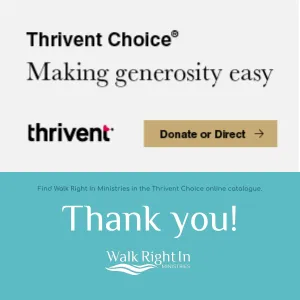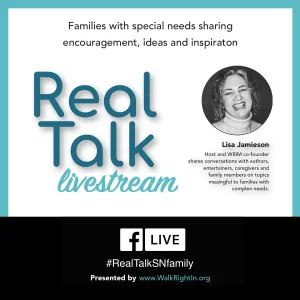Who or What Holds the Power in Your Caregiving Family?
Caregivers who are suffocating in emotions might try to self-medicate their suffering. I am tempted to rely on projects to numb or relieve feelings of overwhelm, exhaustion, anxiety, frustration, or grief.
Where we run for relief makes all the difference.
Pop over to the blog today for two questions that help caregivers gain insight about how to build real strength at home.
Building Your Powerhouse
Despite all our efforts to build a life that is not ruled by Carly and her needs, it is still Carly and all her complexities that influence virtually every aspect of our lives in very significant ways.
Caregiver, we know you adore your children. But disability is consuming and we all get tired.
Read today’s blog for encouragement, some resonance, vision, and a prayer that God will build powerhouses among us.
Thriving Caregivers Prioritize Soul Care
Sometimes I have an opportunity to escape being a mom, wife, and the primary caregiver to our adult daughter with Angelman Syndrome. It may just be for a couple of hours but one rather simple and satisfying way I can do this is to take a long bath and read a book or magazine. I might even give myself a pedicure. It’s a luxurious time of pampering to light a candle, pull out the Epsom salts and indulge in some “me” time.
Truth be told though, I could live without the pedicure and even the soak in the tub. What I cannot really live without is some time to myself to organize my thoughts, to rest from my responsibilities, to remember who I am apart from loved ones around me and to renew or deepen my connection with God.
What are you best at — taking care of yourself or taking care of your soul? Where is your focus?
You will be a better caregiver for others when you take good care of your soul.
In today’s blog, we’re exploring the differences and similarities between self care and soul care.
WRIM Welcomes Deb Gustafson to the Ministry Team!
Walk Right In Ministries is thrilled to welcome Deb Gustafson to our ministry team! She will be serving the WRIM community through administrative support and special projects.
Deb’s passion is to ensure people have what they need to succeed. She understands that each of us comes with a unique story and loves to watch how God uses our stories for His glory and purpose.
As we introduce Deb today, we’ve asked her to tell you some of her own story about how God lead her to share in this ministry. Jump over to the blog to read the full interview with Deb.
Respite Rhythms (Part 3): Pace Yourself!
This is Part 3 in our series and Respite Rhythms and another installment in the ongoing discussion about the 8 Habits of Caregivers with a Robust Support System. Today, Lisa is sharing some “pro tips” for you to consider. These ideas have been gathered from personal experience and numerous conversations with other family caregivers throughout over 20 years in ministry.
If you are the parent or other family caregiver of a loved one with disabilities, you will understand the scarcity of things like rest, discretionary time, spiritual retreats, or even spontaneous intimacy in the marriage bed. It may not be possible to get the frequency or nature of breaks you hope for. But it is possible to achieve an adequate rhythm of respite and find a reasonably balanced pace of refreshing activities.
In fact, it is essential for caregivers to achieve some reasonable balance in this area. Without it, we are at risk of things like bitterness, burnout, and breakdown. Adequate respite rhythms keep us resilient in the short term and sustainable for the long haul.
Jump on over to the blog and catch ten practical pro tips from this mini-series on respite rhythms.
Respite Rhythms (Part 2): How Much is Enough?
This post is part of an ongoing conversation on the blog about the 8 Habits of Caregivers with a Robust Support System. We have been revisiting each of the habits with stories and tips on each one. Again today, we’ve been focusing specifically on Habit #6: Find your pace for an adequate rhythm of respite.
The goal of developing an adequate respite rhythm is to maintain reasonable health and well-being. A looming question then is: How much respite is enough respite?
Unfortunately, the intensity of caregiving required of some parents and family caregivers doesn’t allow for anything close to the ideal lifestyle we need or hope to enjoy. But some reasonable degree of rest and refreshment must be achieved. It’s a matter of physical, emotional, spiritual, and relational health for the caregiver as well as quality of life for a family and the one needing the aid of others.
Jump on over to the blog and read what Lisa learned about respite from a scrapbooking weekend. She’s also posted two really helpful lists — one with areas of life than will benefit from intentional pacing and another with numerous examples of ways caregivers can get refreshed.
Respite Rhythms (Part 1): Start with Trust
Parents, adult siblings, and others who care for someone with complex medical needs or developmental disabilities struggle to get the breaks and rest they need. The obstacles are numerous and varied so it is tempting to just quit trying. Nonetheless, there is a way to approach respite that offers some satisfying and beneficial balance.
There is an adequate rhythm of rest to be found and it’s as unique as you are.
Because finding adequate respite rhythms is very challenging but holds such significant opportunity for caregivers, we’re devoting the next three posts to the topic. We’ll be exploring more ways of finding a reasonable pacing of refreshment in your family and/or marriage when living with someone who has disabilities and/or complex medical needs.
Respite Rhythms (Part 1): Start with Trust
Respite Rhythms (Part 2): How Much is Enough?
Respite Rhythms (Part 3): Pace Yourself!
Head on over to the blog because we’re just getting started with inspiration and practical ideas!
An Introduction to Special Needs Financial Planning
Raising a child with special needs can bring joy and challenges. Alex Gonzalez and his wife, Simone, know this well because their oldest son, Jake, lives with autism and Asperger syndrome.
As both a parent and Thrivent financial consultant, Alex sums up his experience with this simple message: “Try not to go it alone.”
On today’s blog, Alex shares very practical tips about the financial planning process that can be of help to any family living with disability — at any stage of life.
8 Truths About Disability & Relationships
The Bible provides many anchoring truths to guide us and spur us on in life. Caregiving families see those truths tested with extraordinary perspective. We also get to see — up close — how a foundation in certain truths stirs our compassion for each other, bolsters our sense of purpose in suffering, and reassures us that each person in our family is celebrated by God.
Consider how our lives would be transformed if we really believed this one thing about ourselves and each other:
Each and every one of us is one hundred percent unique, purposed for God’s kingdom, and made for belonging.
In today’s post, we’re taking a closer look at this foundational belief though the lens of eight truths about disability and relationships.
Can Caregivers Expect Something Out-of-this-World?
When parents find themselves in a life of complex — possibly even lifetime — caregiving, as we have with our daughter, Carly, we are regularly faced with hoping for healing, praying over various obstacles and longing for sleep. We are constantly grappling with expectations that life could get better or easier while frequently pushed to the limits of our capabilities and capacities.
When the needs of our child are complicated by disability and/or medical issues, the bar of expectations is naturally raised. We are quite desperately reliant on having a robust system of supports in place in order to maintain quality of life. We don’t want to be so needy. But we have found ourselves in an unexpected dilemma.
Like it or not, caregiving radically alters our realities and mindsets about what we need and expect from ourselves, others, life, and God. We must work out our expectations of that system on a daily basis.
Expectations — that is the subject over at the blog today. Head on over and check it out!
This is part of our ongoing series on the 8 Habits of Caregivers with a Robust Support System.









